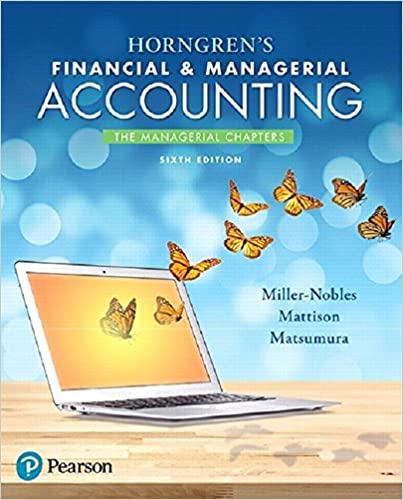Question
Campus Bagels bakes and sells authentic New York-style kettle-boiled bagels. For the most recent year, Campus Bagels sold 160,000 bagels at a selling price of
Campus Bagels bakes and sells authentic New York-style kettle-boiled bagels. For the most recent year, Campus Bagels sold 160,000 bagels at a selling price of $1 per bagel. During this same year, Campus Bagels incurred fixed costs of $75,000 and variable costs of $0.25 per bagel.
Management of Campus Bagels is considering extending their product line to include bagel sandwiches. Management plans on selling each bagel sandwich for $4. At this price, they estimate selling four bagels for each bagel sandwich. Moreover, the variable cost per bagel sandwich would be $1.25 and the decision would increase Campus Bagels' total fixed costs by $27,350 per year.
Required
(a) For the most recent year (with just the bagel sales), what was Campus Bagels' Margin of Safety? With just the bagel sales, at what sales level would Campus Bagels attain a Margin of Safety of 100%? Can Campus Bagels achieve this Margin of Safety? Explain.
(b) Assume Campus Bagels decides to introduce bagel sandwiches. At the expected sales mix, how many bagels and bagel sandwiches does Campus Bagels need to sell at the breakeven point?
(c) Assume again that Campus Bagels plans to introduce bagel sandwiches and will sell four bagels for each bagel sandwich. Additionally, Campus Bagels desires to have the total breakeven volume (i.e., number of bagels + bagels sandwiches sold) equal 81,880. Further assume that Campus Bagels has yet to set a selling price for bagel sandwiches. What price would Campus Bagels need to charge for each bagel sandwich to make the breakeven volume equal 81,880 total items?
(d)This part is unrelated the parts a, b, and c above. In class, we discussed two broad approaches to break-even analysis in setting with multiple products. The first approach is to first allocate the common fixed costs to individual products on some basis, and then conduct break-even analysis on a product-by-product basis. The second approach is to assume a certain "product mix" and compute the break-even point without having to allocate common fixed costs. Which method is theoretically more appealing and why?
Step by Step Solution
There are 3 Steps involved in it
Step: 1

Get Instant Access to Expert-Tailored Solutions
See step-by-step solutions with expert insights and AI powered tools for academic success
Step: 2

Step: 3

Ace Your Homework with AI
Get the answers you need in no time with our AI-driven, step-by-step assistance
Get Started


